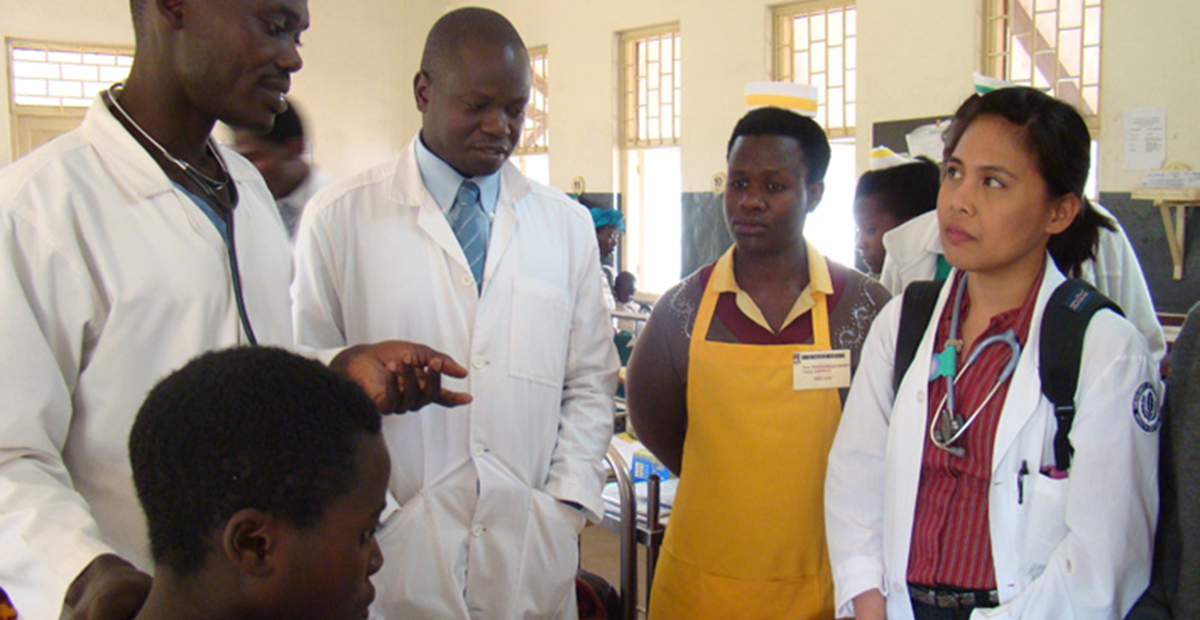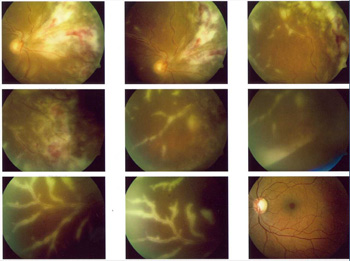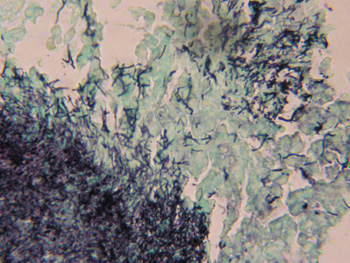
The Infectious Diseases Fellowship Program at UConn is a multi-hospital, two-year program that seeks to prepare physicians for academic positions or for the practice of clinical infectious diseases. Training for sixteen months of the program emphasizes clinical infectious diseases through inpatient rotations at the UConn Health, Saint Francis Hospital and Medical Center (SFHMC), Hartford Hospital (HH) and The Hospital of Central Connecticut (THOCC). During these experiences, the fellow has a major role in the instruction of residents and medical students rotating with the ID Consult Service.
Outpatient clinics are held at UConn Health, HH, SFHMC, and THOCC. Fellows will have a longitudinal clinic at one site and will develop skills to manage a variety of infectious diseases including HIV/AIDS, Lyme disease, osteomyelitis, long-term antibiotic management, and other consultative issues. Additional outpatient experiences in international and travel medicine, adult immunizations, sexually transmitted diseases, and tuberculosis are incorporated into the curriculum.
The remainder of the program is quite flexible and is developed according to specific career goals. A wide variety of additional experiences is offered, including advanced clinical microbiology, hospital epidemiology/infection control, pediatric infectious diseases, global health, and transplant infectious diseases. Specific training tracks are available for fellows who desire more focused experiences as well (see links under “Training Tracks”). A wide variety of additional experiences is offered, including additional clinical microbiology, hospital epidemiology/infection control, pediatric infectious diseases, and transplant infectious diseases. Some fellows choose to participate in the graduate program in public health through the UConn Graduate School international clinical and/or research experiences may be arranged through on-going collaborations between UConn faculty and several international sites, with recent infectious diseases fellows participating in electives in Uganda and Colombia. All fellows pursue a research project under the supervision of a faculty mentor. Opportunities exist for both clinical research as well as training in the basic science laboratories of the Division of Microbial Pathogenesis or the Department of Molecular Microbial and Structural Biology.
The multi-hospital basis for this program is strengthened by the close working affiliation of the infectious diseases faculty of UConn Health with Saint Francis Hospital and Medical Center, Hartford Hospital, and The Hospital of Central Connecticut. The faculty members at these hospitals are all active participants in the training program. In addition to the regular schedule of clinics, in-patient rounds and consultations, all of the fellows participate in a series of "core" conferences held weekly at UConn Health. Weekly conferences, including InterCity Rounds, Journal Clubs, and research presentations, are well attended by faculty from all four sites, as well as participants from Microbiology and Pharmacy.
Most participants in this program will have completed three years of house-staff training in Internal Medicine and all are required to have passed parts 1, 2, and 3 of the USMLE. The salary level is that of the Graduate Education Program of UConn Health.
Program's Mission Statement
The Division of Infectious Diseases is charged with the education and development of individuals who are seeking further training and certification in the field of infectious diseases. The training experience will introduce the core concepts of microbiology, immunology and host defenses, epidemiology, clinical medicine and research that underpin the practice of this subspecialty. It will also focus on the development of interpersonal skills, professionalism and systems-based medicine, such that graduates are prepared to succeed in any number of practice settings the field has to offer, including inpatient consultative practice, outpatient practice including HIV care, public health, academic medicine, drug discovery, among others.
Program's Aims
The UConn ID Fellowship Training program aims to successfully train providers who:
- Practice comprehensive, evidence-based, compassionate care to patients with infections, both acute and chronic, and on inpatient and outpatient bases.
- Are well rounded in their breadth of experience and ability to function in various practice settings, including hospital-based ID and epidemiology, ambulatory ID (HIV, viral hepatitis).
- Are effective antimicrobial stewards in both inpatient and outpatient settings, and as such, are able to educate peers, staff, and trainees on these concepts.
- Are aware of the ever-growing problem of multi-drug resistance and are able to mitigate this by utilizing clinical acumen and skills, and to accurately and efficiently communicate with lab personnel and local health departments.
- Are mindful of the overall well-being of their patients, as well as their own well-being as providers, in order to maximize mutual benefit in the clinical relationship.
- Are not only citizens of the world, but are acutely aware of the status of infectious diseases on a global scale, having had the opportunity as fellows to travel to, learn about, and provide care in developing areas of the world.
Goals and Objectives (by Competency):
1. Patient Care
- Accurate history taking as it pertains to infectious diseases including an assessment of epidemiological risk factors.
- Physical examination skills necessary to substantiate and confirm a suspicion of a contagious disease.
- Construction of a reasonable differential diagnosis.
- Efficient and cost-effective laboratory evaluation to substantiate an infectious diseases diagnosis.
- Formulation of a management plan including administration of antimicrobial therapy where appropriate.
2. Medical Knowledge
- Development of an appropriate knowledge base in order to efficiently practice infectious diseases independently, as well as be able to teach patients, trainees, and colleagues.
- Ability to access and expand knowledge based through self-directed learning.
- Development of the ability to understand and manage complex infectious diseases problems, including but not limited to infections in transplant and other highly immunosuppressed populations, HIV and Hepatitis management, and tropical medicine.
3. Practice Based Learning and Improvement
- Ability to assess and improve skills, and are able to participate in quality improvement initiatives.
- Development of the ability to access and use advances in technology related to infectious diseases.
4. Interpersonal Skills
- Development of the ability to establish and maintain effective relationships with patients, relatives, and professional colleagues.
- Maintaining of timely, legible and functional medical records.
5. Professionalism
- Development of an attitude of respect for patients, peers and subordinates.
- Development of honesty and ethical behavior.
- Recognition, acknowledgement and correction of errors.
6. Systems Based Practice
- Efficiently access and utilize resources to provide comprehensive and effective care for patients with infectious diseases.
- Participation in the reduction of errors and the development of patient safety.
Sample Schedule
| Year One | |
| Block | Rotation |
| 1 | Microbiology and Public Health* |
| 2 | UConn Health |
| 3 | Elective - Ambulatory ID* |
| 4 | UConn Health |
| 5 | Saint Francis Hospital |
| 6 | Elective - Research* |
| 7 | Elective – Pediatric Infectious Diseases at CT Children’s* |
| 8 | Saint Francis Hospital and Medical Center |
| 9 | Hartford Hospital |
| 10 | Hartford Hospital |
| 11 | Elective – Hospital Epidemiology and Antimicrobial Stewardship* |
| 12 | The Hospital of Central Connecticut |
| 13 | The Hospital of Central Connecticut |
| Year Two | |
| Block | Rotation |
| 1 | Elective - International/Tropical Medicine* |
| 2 | Hartford Hospital |
| 3 | Elective – Orthopedic Infectious Diseases* |
| 4 | Hartford Hospital |
| 5 | UConn Health |
| 6 | Elective – Research* |
| 7 | UConn Health |
| 8 | Transplant Infectious Diseases* |
| 9 | The Hospital of Central Connecticut |
| 10 | Elective - Advanced Microbiology* |
| 11 | The Hospital of Central Connecticut |
| 12 | Saint Francis Hospital and Medical Center |
| 13 | Saint Francis Hospital and Medical Center |
Program Highlights
-
Two Year Fellowship Program
-
Clinical Training
- Medical Education focus
-
Consultation and Primary Inpatient Care
-
Ambulatory Infectious Diseases
-
Travel/Tropical Medicine
-
HIV/AIDS
-
Lyme Disease
-
Viral Hepatitis
-
Adult Immunization
-
Tuberculosis
-
Osteomyelitis
-
Outpatient Antibiotics
-
-
Research Training
-
Clinical Research
-
Basic Research (Molecular Biology, Immunology, Cell Biology, Virology)
-
-
Medical Microbiology
-
Epidemiology
-
Hospital Infection Control
-
Transplant Infectious Diseases
-
International Clinical and/or Research Elective Opportunities

